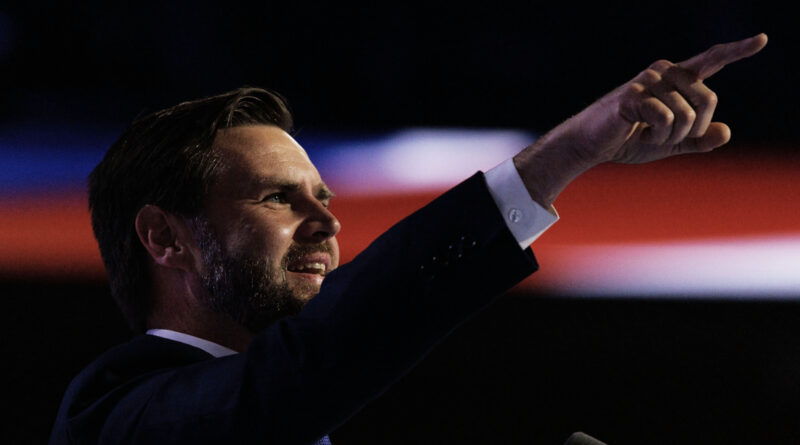JD Vance’s Old Blogs Are Boring — And Instructive
Republican vice presidential nominee JD Vance has had a rough start.
Polling site 538 reports a steady net negative in favorability; Trump allies are reportedly second-guessing his spot on the ticket; even his wife has been forced onto the campaign trail to defend the Ohio senator’s caustic past remarks about women.
His supporters blame the media. His critics blame his hardcore social conservatism. But a better explanation lies farther back in Vance’s past, when he didn’t just hold a different set of political beliefs, but a different identity entirely: He used to be a blogger.
In the early 2010s, the then-incoming Yale Law student JD Hamel (his former adopted name) penned a handful of brief, mostly undistinguished political op-eds for FrumForum, a blog hosted by former George W. Bush speechwriter and current Never Trumper David Frum. His posts tackle typical, almost quaint Obama-era Republican fare: Jon Huntsman vs. Mitt Romney (he preferred Huntsman); Grover Norquist and ethanol subsidies (Norquist was a “fiscal phony”); Paul Ryan’s proposed austerity budget (the left will “overreact”).
To be candid, the content of the blogs themselves is not very interesting. But the mind on display in them — and still to this day, in Vance’s bestselling memoir, Hillbilly Elegy, and various op-eds and essays — is one that clearly relishes political ideas in their own right. As Trump’s running mate, however, Vance has entered a political arena where the main weapons are popularity, style and charisma — not proving his political-philosophical chops. His awkwardness on the trail so far illustrates that his approach to politics, honed in the world of elite colleges and intellectual cliques, doesn’t really translate to the national stage.
Take this line from his blog about Huntsman, in which he cites a thwarted Supreme Court nominee’s fiery treatise against liberalism to explain his own political origin story: “I became a conservative after reading Robert Bork’s Slouching Towards Gomorrah.” Probably not a lot of conversation about that one going on aboard the Trump-Vance campaign’s new jet.
Vance’s critics often seize on his perceived hypocrisy, as seen in his transformation from a science-believing, Huntsman-loving elite Republican to a Trump-boosting, anti-abortion champion of the working class. But the deeper issue on display in his old blogs has nothing to do with flip-flopping on the issues he tackled back in the day. Vance has become a liability on the presidential ticket not for his inconsistency — hardly an issue in a GOP where fealty to Trump is the overriding virtue — or even for the specific opinions he used to blog about, but for the ideological way he sees politics, which is directly at odds with the often grubby and compromise-filled endeavor of trying to persuade voters and win an election. Any blogger with a sense of intellectual pride is bent on seeking out, and persuading others of, political truths, no matter how arcane or even downright unpopular they may be. Candidates, on the other hand, are supposed to sell people on an inspiring political message, avoiding issues that could turn off voters. One job is about being right; the other is about winning.
“Trying to be an interesting writer and trying to be an effective politician are somewhat antithetical,” said Matthew Yglesias, the Vox co-founder who launched his blogging career in the early days of the Iraq War.
He compared the vice presidential nominee to Sen. Elizabeth Warren (D-Mass.), who, as a former professor, is known for taking a wonky approach to politics. Like Vance, Warren occupies a safe Senate seat that gives her an electoral cushion from which to push her own party’s ideological boundaries, even as she polled poorly compared to her competitors in the 2020 race for the Democratic presidential nomination. (Not coincidentally, the two politicians have been unlikely allies on economic populism in the current Congress.)
One could also compare Vance to Barack Obama, whom the Ohio senator once described as a role model with “a prestigious law degree, a strong professional career and a modicum of fame as a writer.” Obama, too, wrote an early autobiography and parlayed his love of ideas into a national profile as a wunderkind pol with a vision of transforming his party.
But where Obama differs from Vance is that he made an effort to reach beyond his academic milieu, immersing himself in real-world political organizing by spending crucial early years with the grassroots on Chicago’s depressed South Side — and took a bruising, humbling political loss on his way to the top. In contrast, Vance’s literary celebrity and connections to figures like Trump and investor Peter Thiel enabled him to bypass the steps that might have channeled his intellectual passions more pragmatically.
Washington Monthly’s Bill Scher (who has also contributed to this magazine) pointed out on X this week that the farther Vance has come from his blogging days, the more reckless and politically ill-considered his public statements have been. There was the “childless cat ladies” comment during an appearance on Tucker Carlson’s program. There was his approving invocation on a far-right podcast of the writings of dictator-friendly blogger Curtis Yarvin. There are statements about abortion that put him well outside of the American mainstream.
Electoral politics rarely calls for Vance’s more intellectual qualities, much less in the MAGA-fied Republican Party. With his comments about “cat ladies” and exaggerated fealty to Trump, Vance is playing to an audience, but at the same time attempting to channel his ideological beliefs — in this case, that gender progress over the last few decades has had a net negative effect on American politics and life — into the vessel of the modern GOP and its social media-driven Trumpist politics, hence the taunting language. It’s an attempt at translating the kind of ideas you might find in a conservative blog into the MAGA mother tongue.
In an interview with New York Times columnist (and blogosphere veteran) Ross Douthat, Vance was guarded about this dynamic. Without necessarily comparing the former president to himself, he argued that Trump’s political superpower was to be a vessel for political ideas without actually talking about them. (He also compared today’s liberal political thought to that of the Nazi legal scholar Carl Schmitt — he just couldn’t help himself.)
“Like a lot of other elite conservatives and elite liberals, I allowed myself to focus so much on the stylistic element of Trump that I completely ignored the way in which he substantively was offering something very different on foreign policy, on trade, on immigration,” Vance told Douthat in explaining his political evolution. He praised Trump’s unpredictable, caustic public persona as “overlap between style and substance” and “a strength of Trump, and not a weakness” in enacting his policy agenda over the protests of the federal bureaucracy.
In Obama’s memoir of his presidency, A Promised Land, the loquacious former president pays his own tribute to the tension between his strongly held political beliefs and his ability to translate them into a winning platform. He anguishes over whether, “trapped in my own high-mindedness, I’d failed to tell the American people a story they could believe in; and whether, having ceded the political narrative to my critics, I was going to be able to wrest it back.”
Intellectuals (and fellow Ivy League lawyers) Obama and Vance both clearly understand the power of a persuasive, well-reasoned and deeply felt political philosophy, but they channel them in profoundly different ways. Vance’s method is a kind of one-two punch of red meat for the laity and high-minded essays for the clergy. This tactic is still mostly untested — but it’s already showing unpromising early returns.
Still, as much as journalistic traditionalists and hardened pols alike might cluck their tongues at it, there are legitimate upsides to the blogger-intellectual’s combination of “challenging” and “high-minded.” It’s earnest and curious, unconcerned with popularity contests, and in its highest forms encourages a healthy respect bordering on reverence for historical context.
Vance’s version of a pugilistic, far-right social conservatism is tailor-made to energize the wonks, donors and fellow bloggers that power the Trumpian ideological project. He’s largely succeeded in doing that. In the world of ideas, the backlash to such popularity usually comes in the form of a critical blog or a storm of opprobrium on social media.
But to contrast it again with the world of actual politics, backlash can also come in the form of mobilizing crucial electoral blocs, such as suburban women, against you. Polls and unfavorable media cycles are one thing, but Vance ultimately won’t find out whether he’s struck the right balance until November.
“I kind of appreciate that [Vance] is a broad reader and participant in the world of ideas; I find that admirable even if it’s unusual in a potential vice president,” Yglesias said.
“The women I know who are involved in Democratic Party politics? They’re like, ‘No. This guy sucks.’”


